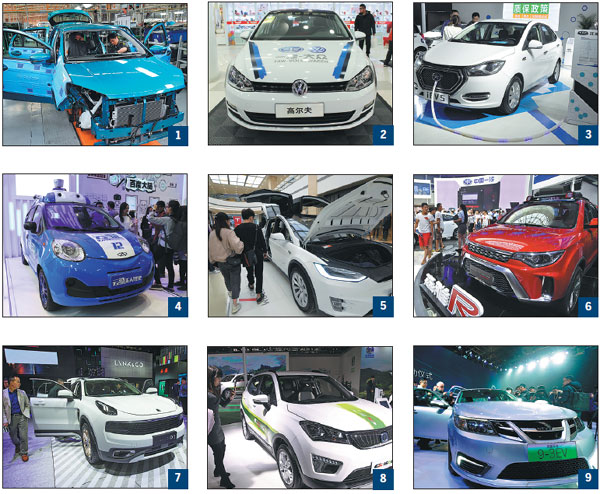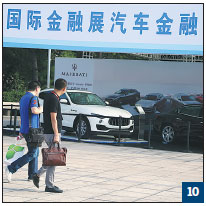Rearview mirror: car industry's hot topics in 2017

China Daily takes a look at the top headline-grabbing stories from the world's largest auto market last year
1. Duel-credit policy to tackle emissions
China issued a dual-credit policy in late September in an effort to cut gasoline fuel consumption and stimulate the development of new energy cars, including electric cars and plug-in hybrids. In 2019, automakers in China must gain credits for new energy cars equivalent to 10 percent of all its cars, with one vehicle generating multiple credits. The quota will rise to 12 percent in 2020. If they cannot meet the goal, they can either purchase credits from other carmakers or face a fine. The policy has prompted many international brands, including Volkswagen and Ford, to launch new joint ventures with local Chinese carmakers.
2. VW signs 3rd local joint venture
Volkswagen became the first international brand to have three passenger car joint ventures in China when the German automaker signed a deal with Anhui Jianghuai Automobile Co in June. The 50-50 partnership, which is dedicated to developing and producing electric cars, will see a total investment of 6 billion yuan ($882 million). Its first model, which will be produced at existing JAC facilities, is expected to roll off the assembly line in 2018. That would give VW a head start to become the first localized electric car producer in the country, ahead of its rivals such as General Motors.
3. Report: The future is clean and clever
China is set to build a globally competitive automotive industry within 10 years, with new energy vehicles and smart, internet-connected cars taking the lead worldwide, according to an industry guideline released in April. Among other goals, the guideline expects sales of electric, plug-in hybrids and fuel cell cars in the nation to reach 2 million by 2020, and such cars are to account for 20 percent of all auto sales by 2025. Half of new cars in China will feature some driving assistance and low-level autonomous driving functions by 2020, and the number is expected to rise to 80 percent in 2025.
4. Beijing roads open to autonomous tests
Local authorities in Beijing released China's first guideline on road tests of autonomous motor vehicles in December, signaling the country's determination to accelerate the development of the technology. The guideline, compiled by the city's transport commission, public security bureau, and economy and information technology commission, applies to independent entities registered in China. They can apply to test at most five vehicles at a time, but before conducting road tests they must first complete tests in designated closed zones, according to the guideline. Many Chinese companies, both carmakers and IT giants, are already working hard on the research and development of autonomous driving technology.
5. Tesla to build in Shanghai by 2020
Tesla Inc announced plans to produce cars in China by around 2020. The carmaker's CEO Elon Musk said in November that Tesla is about three years away from starting production in China and will not make any significant capital expenditure until 2019. Tesla confirmed in late October to China Daily that it was in talks with the Shanghai city government to build a plant. Musk said the new plant will make cars for China and other parts of Asia, essentially the smaller and cheaper Model 3 sedan and the upcoming Model Y crossover. It will not make the more expensive Model S sedan or Model X SUV in China.
6. FAW, Dongfeng, Changan join hands
Three State-owned Chinese automakers have joined hands to better brace themselves for the market. According to a deal signed in December, FAW Group Corp, Dongfeng Motor Corp and Chongqing Changan Automobile Co are to promote technological innovation, optimize full-value chain operations, expand their global markets and explore new business models. The three companies will build a technology center that will focus primarily on new energy cars, smart and internet-connected cars as well as lightweight car bodies, and also share the results. The cooperation will help Chinese carmakers to gain considerable scale, and build better and more competitive car brands, Changan said in a statement.
7. Geely goes on global spending spree
Zhejiang Geely Holding Co has expanded its global presence after a number of overseas acquisition deals in 2017. Its shopping spree started in June, when it signed a final contract with DRB-Hicom Berhad, acquiring a 49.9 percent stake in the Malaysian company's Proton and 51 percent shares of its sports car brand Lotus. In November, Geely moved to acquire United States startup Terrafugia, which specializes in flying cars. The Chinese carmaker ended its year with a deal to acquire an 8.2 percent stake and 15.6 percent voting rights in AB Volvo, the Swedish manufacturer of trucks, buses, construction equipment and engines. It had acquired Volvo's passenger car unit in 2010.
8. Purchase tax cut can't halt slow down
China's auto market growth is set to slow to a six-year low this year, despite a 25 percent purchase tax cut on smaller car models.
Industrial experts predicted the market's total new vehicle sales volume will reach 29 million units by the end of 2017, for an annual growth rate of 3.5 percent year-on-year.
The purchase tax cut was revised in 2016 to 25 percent on cars with 1.6-liter and smaller engines in 2017, from the previous 50 percent tax cut, to prevent a hard landing of the new car market.
9. Sales of fossil fuel vehicles could cease
Xin Guobin, China's vice-minister of industry and information technology, said in September the government had started considering a timetable to phase out the manufacturing and sales of fossil-fuel powered cars, without giving details on the time frame.
The statement followed similar moves by several countries to end the era of fossil fuel-powered vehicles, aiming to cut carbon emissions and reduce pollution by banning the sales of solely fossil fuel vehicles.
In November, China halted sales of diesel with sulphur content above 10 parts per million to address air pollution. The Fuzhou city government released a plan to replace all fossil fuel buses in the city with new energy vehicles by 2020.
10. Loan policies revised to spur e-car buyers

New loan policies for car purchases were issued in November, allowing buyers of new energy vehicles to borrow a larger portion of the purchase price.
Starting in 2018, electric car buyers can borrow up to 85 percent of the cost from banks, according to the People's Bank of China and the China Banking Regulatory Commission.
The maximum loan for cars using traditional fuel is set at 80 percent.
The purchase of fossil-fuel cars and electric vehicles for commercial use will enjoy lower loan ratios of 70 percent and 75 percent, respectively.
(China Daily 01/08/2018 page19)














